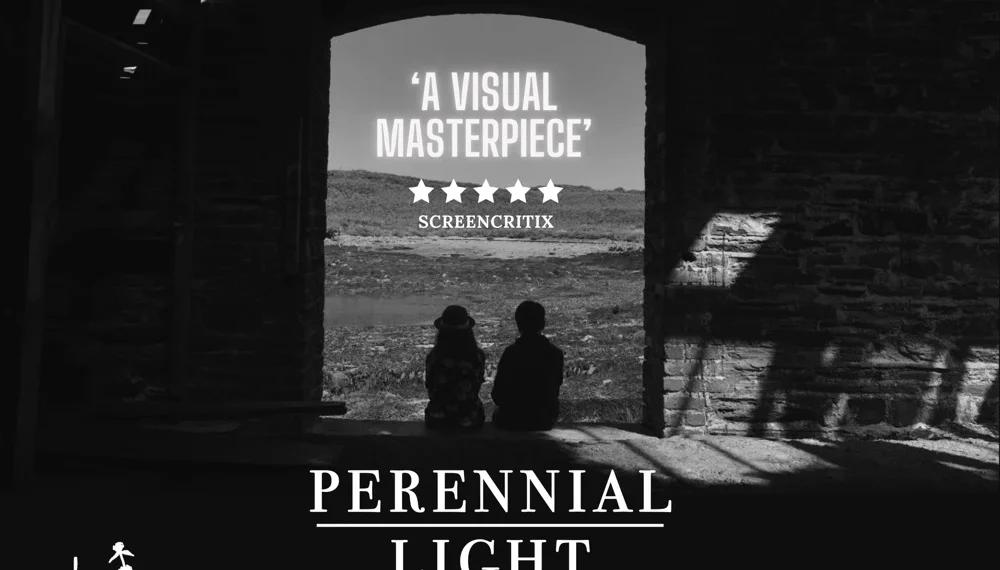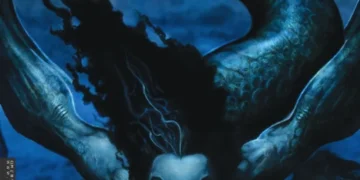Cast: Liam Cotter, Clara Rose Hickey, Colin Hickey, Sahar Jarrahie-Koom, Ciara Kirby, Muriel O’Brady, Finn O’Donovan, Jack O’Mahony
Genre: Drama
Director: Colin Hickey
In Irish Cinemas: Now
Perennial Light is a breathtaking cinematic experience, an art film that stands apart from anything currently in the mainstream. It embodies the best of experimental filmmaking, embracing a daring and unconventional approach to storytelling. Stripped of dialogue and a traditional narrative structure, this independent Irish film offers a profoundly personal, seemingly autobiographical account of one man’s life. It follows his journey from a turbulent youth to adulthood, chronicling pivotal moments such as personal tragedies and glimpses of family life in a rural setting. What unfolds feels less like a straightforward story and more like a fluid stream of memories imbued with wistful nostalgia and quiet melancholy.
The film is a visual masterpiece, rendered entirely in black and white. Yet what truly sets it apart is its inventive use of drawings and animatics, which enrich the protagonist’s emotional journey. These childlike illustrations, depicting themes ranging from wonder and joy to introspection and despair, offer the film a profound layer of meaning. These visuals do more than mirror the character’s inner world—they resonate with a universal human experience, suggesting how the rhythms of nature itself intertwine with the arc of life. The images weave a tapestry of memory and mood, inviting viewers to explore their recollections.

Director Colin Hickey has crafted a cinematic opera with remarkable simplicity, drawing inspiration from the every day: animals, foliage, and weather play as much a role as human elements. The result feels meditative, almost like a visual journal of psychological and emotional states—a cinematic form of remembrance.
The craftsmanship of Perennial Light is evident in every frame. The monochromatic cinematography achieves a stunning depth, with striking contrasts accentuating the interplay of light and shadow. The black-and-white palette feels anything but gimmicky; instead, it serves as a precision tool, amplifying the film’s emotional weight. Hickey’s understanding of composition is exceptional—his use of silhouette, layering, and stark framing creates imagery that lingers in the mind. Each shot feels purposeful, designed to evoke a visceral response.

One of the film’s most impressive aspects is its willingness to experiment with digital technology. For viewers who cherish the texture of traditional film, Perennial Light doesn’t attempt to replicate it but instead carves out its distinct aesthetic. For example, drone shots—often mishandled in less capable hands—achieve a painterly elegance here. These aerial perspectives place individuals against vast, sweeping landscapes, creating a sense of grandeur and existential reflection. Similarly, including motion blur and smoothing effects might feel risky in other contexts. Still, in this film, they heighten the impressionistic quality, as if the past is softly dissolving in the mind’s eye.

To call Perennial Light a “tone poem” might feel like falling back on a cliché, but few films earn that title as authentically as this. It is a symphony of moods and ideas expressed through music, editing, and visuals, all working harmoniously. The sound design, often overlooked in similar projects, is superb—immersive and visceral, it adds another layer of depth to the hauntingly beautiful imagery.
Ultimately, what makes Perennial Light so unique is its sincerity. Every frame has a genuine passion and a sense of personal truth that resonates throughout. Dreamlike yet deeply grounded, it offers a rare cinematic pleasure: a contemplative, emotional, and profoundly human experience.
Overall: 8.5/10


















